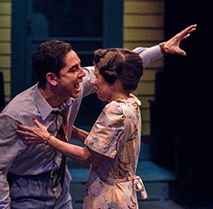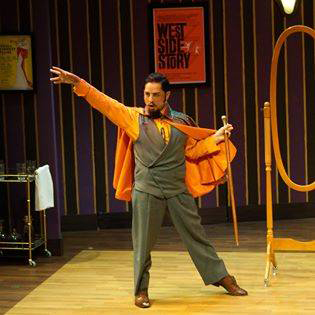With a slew of regulations and mandates, the live theatre scene has looked a little different in Buffalo this year. Not to be discouraged, we sat down with Buffalonian Anthony Alcocer to reminisce about the theatre, what we most look forward to when we can return to it in full capacity, and some of his tips and tricks for those looking to break into the scene themselves!
Anthony is a Buffalo-based theatre actor. As COVID regulations slowly lift, he is most looking forward to “acting in and seeing plays, musicals, opera, symphonies, sports, concerts, people, dogs—anything!” as well as watching the Buffalo theatre and all aspects of arts and culture everywhere begin the process of truly thriving once more. He currently resides in Buffalo with his wife, Katie (Irish Classical Theatre Co. Artistic Director), and their son, Santiago.

____
How did you get started in acting? Was there anything in particular that drew you in?
I was three years old when I was in my first play, and ever since I really can’t remember a sustained period of time when I wasn’t acting on stage. The love of acting and being on stage was gifted to me through my older brothers, and then in turn, when I grew older, I shared that passion with my two younger (and more talented) siblings. I saw how much fun the older two were having—they were both naturals. I even got to play brothers onstage with one and have shared the stage with all my siblings.
I’ll be frank, however, and say I am the one in the family who found the process of the work, the craft, practicing daily, rehearsing tirelessly, and trying to build characters from the page to be the most fun. I believe that’s what separated me from my talented and charming siblings. They all have a fondness and great enjoyment for theatre still, but I pursued my career with abandon as I continued to grow.
____
Do you have a method you go by when tackling a new role?
I was trained extensively in the Stanislavski Method (also called “the art of experiencing”) wherein I was tasked with turning psychology into behavior. I believe a good actor is simply the facilitator of the director’s interpretation of the author’s intent. In this, I am willing to try and fail as many times as my director will allow, as well as receive as much criticism from them as necessary in order to get where we need to go together.
I also imagine myself as a reactor more than anything, and I try my utmost to be as open and as available to my scene partners as I can. When I think about acting, I recall when I first heard a virtuoso playing Vivaldi: for a few moments I wondered, “Is the player putting the music into the violin, or pulling it out from the violin?” The same, I think, is true for my process; the actor must be both the created character and the intention of the author, simultaneously.
____
What are some of your favorite parts of the Buffalo theatre scene?
“There’s no people like show people.” Absolutely my favorite aspect of the scene we enjoy in our fair city are the very people that make our business so grand! It did not take a pandemic to help me realize this, but it certainly has highlighted just how very important the community is to me. When we gather on Main St. downtown and pack in scores of talented professionals for Curtain Up and the Artie Awards to mark the beginning and end to each season; or when we gather for our opening night parties and fundraisers, and most of all, when we share in each other’s success at Matinee Bar, it is the fondness, respect and love that I cherish.
____
Do you have any particularly fond memories of acting, or is there a show/role you would return to if you could?
I was in school at Florida State and getting frustrated that I wasn’t winning roles that had as much responsibility as I’d like. I didn’t realize it at the time, but I was simply a selfish and lazy actor with some raw talent just coasting by and had yet to work very hard on anything difficult. Then I was given a chance to play Jacques Roux in Marat/Sade by Shaffer. The director put me through a grueling process of physical and psychological exercises to see how in-depth I wanted to go. That process turned out to be an enormous breakthrough for me. Everything started to click from the Method training; I disappeared into my character, and even my own mother did not recognize me until she looked in the program at intermission. From then on, I decided, it’s about the character and the story, it’s not about me at all.
____
Is there a character you’d love to play but haven’t gotten the chance to yet?
Both of these roles are so iconic, so I would make a thorough attempt to breathe new life into them, not just put on a pageant show. For a straight play, I would really like to take a shot at Stanley Kowalski. Williams gave us one of the greatest and yet most difficult male roles of the 20th century. I believe with my brand of research, energy, thoughtfulness, and diligence, I could shape a Stanley who is less about overpowering an audience, and more about witnessing battered pride in themselves. For musical theatre, I have been aching to appear as The Emcee since I first heard Cabaret on record. It is one of the ultimate roles for a chameleon actor, just begging to be formed and shaped in every which way.
____
Any advice you have for aspiring actors, or those who have considered getting into the craft?
If there is something else you want to do, go do that. Otherwise, “Stay in the here and now.” (Easier said than done!) Leaving baggage at the door is one thing, but it’s entirely different to completely get out of yourself so honestly and unselfishly that you abandon your own psychology and begin to facilitate someone else’s.
“A good actor is simply the facilitator of the director’s interpretation of the author’s intent.” — this may remind an actor of how they fit in the grand scheme. For me, it gives courage to try anything once, a thirst for guidance, and energy to grind whatever grist the mill requires in order to give my absolute all.







Comments